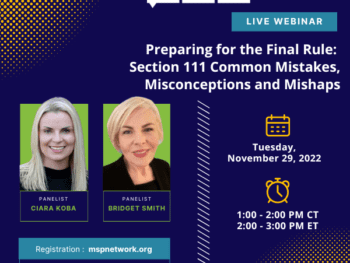
Unless you strictly follow all the requirements of this system, you risk a referral for collections to the U.S. Department of Treasury. Knowing when to call in an expert is a good bet to keep you out of the government’s crosshairs.
Conditional Payments
Medicare does not pay for medical services or treatments which it believes are the responsibility of another entity, such as workers’ compensation. In those cases, Medicare is the secondary payer involved.
A conditional payment occurs when there is evidence that the other entity, workers’ compensation, has not promptly paid the bill. Medicare will then make the payment on the condition it will be reimbursed once the other entity does pay.
The responsibility for collecting the reimbursement rests with either of two entities; the Benefits Coordination & Recovery Center (BCRC) or the Commercial Repayment Center (CRC), which issues a demand for the repayment. If the debt is not paid or appealed to Medicare within 180 days, it is referred to the Treasury Department for collection.
Click Link to Access Free PDF Download
“8 ‘Think Outside the Box’ Tactics to Settle Workers’ Comp Claims”
Collecting the Debt
The Treasury Department has a number of methods to collect on debts owed to the federal government. For example, there are
-
- Demand Letters
- Telephone calls to the debtor
- Administrative wage garnishment
- Credit bureau reporting
- Private Collection Agencies (PCAs)
One other avenue is the Treasury Offset Program or TOP. This program allows the Treasury Department to offset a federal payment to the debtor and use the offset to pay the debt.
For example, if the debtor is owed a tax refund, the money it will be taken from the refund. Or, if the debtor is receiving a grant or rent money from the federal government, it will be taken out of this payment.
This system can create major headaches for carriers or a self-insured employers’ accounting departments, as less money than expected is received from the federal government. The result is the claims department, or risk manager gets called in to explain why the federal government is deducting these amounts as a result of a workers’ compensation claim and why the matter was not handled timely to avoid this issue.
Case study (provided by Towers MSA Partners); Resolving a Conditional Payment Dispute
Challenge
In this particular case, a self-insured real estate investor leases property to various entities, one of which is the federal government for a U.S. postal office. An employee of the real estate investor — unrelated to the U.S. post office — had suffered a work injury which was resolved and approved by a worker’s compensation judge. A few years post-settlement, Medicare issued a Conditional Payment Notice and demanded reimbursement of its lien for $14,026.00. The matter was referred to the Department of Treasury for collection, which applied the TOP and withheld federal funds owed for the rent for the postal office space.
Total MSA exposure = $14,026.00
Solution
After reviewing the details of the claim and the demand for reimbursement by Medicare, Tower’s legal team determined an appeal of the entire conditional payment amount was justified because the charges were unrelated to the work injury. The matter moved from the Department of Treasury back to the CRC, which concurred with the appeal that the charges were not related to the work injury, and therefore, not the responsibility of the employer.
Results
CRC agreed with the rationale and determined the payments were appropriately paid by Medicare. Also, the funds previously held by the Department of Treasury have been returned to the employer.
Total Savings = $13,885.64
Conclusion
Complying with Medicare requires continuous attention to the program. While the government has made some changes over the years to simplify the process, you must still engage Medicare in this process
Conditional payments can be tricky as there are specific deadlines and failure to meet them creates problems for workers’ compensation payers, as seen here, with Treasury Department collection actions. Medicare will generally remove unrelated charges from its demands, but it requires payer action to have the charges removed. So, it is especially important to verify that all conditional payments are related to the claim before settlement.

Contact: mstack@reduceyourworkerscomp.com.
Workers’ Comp Roundup Blog: https://blog.reduceyourworkerscomp.com/
©2018 Amaxx LLC. All rights reserved under International Copyright Law.
Do not use this information without independent verification. All state laws vary. You should consult with your insurance broker, attorney, or qualified professional
























